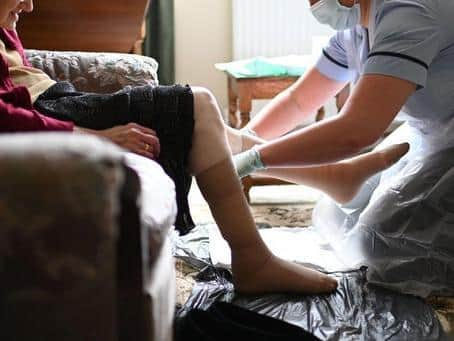Nurses and female health care workers most at risk of experiencing psychological distress during pandemic, new research says
and live on Freeview channel 276
Nurses and female health care workers are most at risk of experiencing psychological distress during the Covid-19 pandemic, according to the pioneering study, by the University of Sheffield.
The study is the largest global review of factors associated with distress amongst health care workers during an infectious disease outbreak, including Covid-19, SARS, Bird Flu, Swine Flu and Ebola.


Advertisement
Hide AdAdvertisement
Hide AdA team of researchers assessed fixed factors such as demographic characteristics, age, sex and occupation as well as social psychological and infection-related factors in more than 143,000 health care workers from around the world.
The review of 139 studies included data collected between 2000 and November 2020.
Lead author, Dr Fuschia Sirois, from the University of Sheffield, said: “Consistent evidence indicated that being female, a nurse, experiencing stigma and having contact or risk of contact with infected patients were the biggest risk factors for psychological distress among health care workers."
Dr Sirois, added by analysing data from previous infectious disease outbreaks such as SARS, Bird Flu and Swine Flu it appears that distress for health care workers can persist for up to three years after the initial outbreak.


Advertisement
Hide AdAdvertisement
Hide Ad"As the world continues to tackle the Covid-19 pandemic it is so important that we identify the health care workers who are most at risk for distress and the factors that can be modified to reduce distress and improve resilience,” she said.
Results also found factors such as the age of health care workers didn't appear to have a significant impact in the findings.
Dr Sirois said: "In some studies older people weren’t distressed - perhaps because they had worked as health care professionals for many years and therefore felt more equipped in dealing with an outbreak
"Whereas younger people who are physically less likely to be affected by the infectious disease tended to be less experienced in dealing with an outbreak professionally, therefore causing them to be more distressed.”


Advertisement
Hide AdAdvertisement
Hide AdAdditionally the study found health care workers benefited from having a social support network.
However living with a partner or children caused increased stress for many who were scared about passing on the infection.
While personal and organisational social support, feeling in control, sufficient information about the outbreak and proper protection, and training and resources, were associated with less psychological distress.
The findings, have informed a new framework which health care providers can use to identify those most at risk of increased distress, as well as areas to target to help build resilience.
Advertisement
Hide AdAdvertisement
Hide AdThis framework can help guide early interventions and ongoing monitoring.
Dr Sirois and a team from the University of Sheffield and the Sheffield Teaching Hospitals NHS Trust are now conducting a further study with NHS workers using this new framework in order to help identify factors which could help to reduce distress during COVID-19.
The study is published in the journal Frontiers in Psychiatry.
______________
Support The Yorkshire Post and become a subscriber today.
Your subscription will help us to continue to bring quality news to the people of Yorkshire. In return, you'll see fewer ads on site, get free access to our app and receive exclusive members-only offers. Click here to subscribe.
Comment Guidelines
National World encourages reader discussion on our stories. User feedback, insights and back-and-forth exchanges add a rich layer of context to reporting. Please review our Community Guidelines before commenting.
